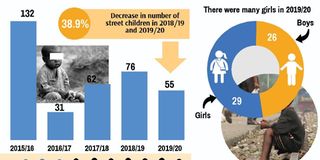Rate of street children falls in Dar es salaam

What you need to know:
Social welfare officers are blaming divorce, cruelty and irresponsible parenthood for migration of children in cities and town where they believe they will lead a quality life.
Dar es salaam. The number of street children in Dar es Salaam city has dropped significantly during the past four years, according to data released by the Kinondoni and Ilala municipalities.
Data obtained by The Citizen from the two municipalities points to a drastic fall in the number of homeless children the city streets.
Some children are reported to have gone back to school following the introduction of fee-free education policy in 2015.
Through Circular 5 which was issued in November 27, 2015, government directed public bodies to ensure that primary and secondary education is free for all children enrolled in public schools.
Municipal councils in the commercial city have also been undertaking a number of initiatives to reduce the number of children staying in streets.
The number of street children has dropped by 58 per cent in 2019/2020 in Ilala and Kinondoni municipalities.
Officials in the Ilala municipalities say there are only 77 street children this year compared to 132 identified in 2015/2016.
In Kinondoni, municipal official say the number of street children has dropped to 6,400 in 2019/2020 from 18,132 in 2016/2017. They link the situation with the introduction of the free education policy.
Among the measures that have helped reduce the number of vulnerable children were a good corporation between local government authorities and social welfare officers in identifying and tracing the backgrounds of the children.
Many other stakeholders at individual and organisational level have worked with the municipalities to ensure the children return to their families.
According to report from Ilala municipality, eight per cent of the children residing in the streets hails from Bahi Municipality in Dodoma Region, particularly Chikola Ward, Chimendeli Village as well as Ngulugano Village and neighbouring villages.
Categories of street children
There are three categories of street children, according to Kinondoni Municipality Social Welfare officer, Giles Londezya.
The first group, he says, is that of part time street children--those found in the streets for a while. These, for instance, enters streets during the evening or morning hours but use to spend most of their time at home places.
He mentions the second category as those who have chosen to stay in streets permanently.
They sleep and wake up in streets. They spend most of their time loitering, begging, and doing casual works like car washing.
The last group is that of hardcore street children. According to the social welfare officer, these are the ones who have become chronic, hard to change. They have grown in streets and spent most of their lives there. Streets are their permanent homes.
Why street children flock to cities
Social welfare officials are blaming attractions in town such as storey buildings, big hotels, entertainment facilities and other state-of-the-art infrastructures for the rural-urban migration of children.
Ilala Municipality Social Welfare Officer Joyce Maketa say many children who get attracted by the facilities opt to stay in town than in their rural homes where there are no such attractions.
Ms Maketa says there is ample evidence that domestic violence and divorce, which have frequently led to miserable lives for children, have highly contributed to the problem. He blames irresponsible parents and guardians for causing children to flee homes.
She also mention death of the parents as another major reason why we have street children. She says the situation has denied many children parental love and the support for basic needs. These would normally end up in orphanages or flee to cities, believing that opportunities to live a decent life are readily available in towns.
Social welfare officials also says peer pressure and mob psychology are the other factors that have frustrated the minds and consciousness of many children who ends up devaluing education and opt to go to streets.
Effects of street life to children
According to Mr Londezya, street life has caused serious health problems to the children. The environment they live are pathetic that most of the children ends up contracting diseases.
Most of street children are school dropouts. Life in streets means no right to education. Adolescent street boys and few girls are known to be vulnerable to drug, physical and sexual abuse.
Moreover, the idle minds means the street children are exposed to temptations to commit criminal acts like theft, drug abuse and burglary. The consequences have always been disastrous for the kids.
The burden of caring recovered children
Ms Maketa says inadequate working facilities like vehicles, centres for rehabilitation of children recovered from streets or as they wait to be reunited with their families was one of the major challenges they face.
She mentions poor cooperation between owners of the centres for vulnerable children and social welfare offices which has led to inadequate supervision of the street children that has caused the kids to flee the homes and going back to streets.
“Some owners of rehabilitation centres refuses to accept children originating from streets,” she says.
According to Unicef, there are 120 million children living in the streets worldwide, out of them 30 million from the African continent. Unicef says 50 million of the children live in streets after losing parents to HIV/Aids.
Ms Maketa has urged the parents and guardians to ensure responsible and loving care for their children which will prepare for their future life even in case of the death of the parents.
“Parents should be keen in upbringing of their and prepare them to be responsible citizen even in case of death of parents,” Joyce stressed.
She argued families to avoid domestic violence and cruelty to their children.
(Reported by Tabia Yusuph, Lilian Ndilwa, Muthini Kisole and Bakari Issa)




